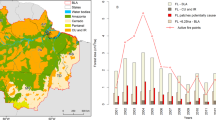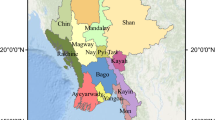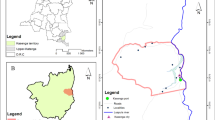Abstract
In this paper, we examine the changes in forest structures in the demilitarized zone (DMZ) and surrounding areas with different civilian access restrictions in the North and South Korean border region during a 23-year study period from 1992 to 2015 (four to six decades after the end of the Korean War). Forest maps were derived from Landsat images, and forest structures were assessed at multiple spatial scales using lacunarity analysis. The results show that the forest structures changed over the 23-year study period, but the directions of change varied according to the degrees of access restriction. Strict access restriction to the DMZ mitigated small-scale forest fragmentation because forests were regenerated on abandoned farmlands. In spite of the small-scale forest regeneration, infrastructure development associated with the economic cooperation between North and South Koreas in the 2000s aggravated large-scale forest fragmentation in the DMZ. Forest fragmentation was even more serious in the surrounding areas where civilian access is allowed because of farmland and suburban developments. These findings reveal the need to adopt a land use regulation system, such as transboundary protected areas, in the North and South Korean border region, to prevent deforestation under the present divided condition as well as under the one after Korean reunification.




Similar content being viewed by others
References
Aide TM, Clark ML, Grau HR, López-Carr D, Levy MA, Redo D, Bonilla-Moheno M, Riner G, Andrade-Núñez MJ, Muñiz M (2013) Deforestation and reforestation of Latin America and the Caribbean (2001-2010). Biotropica 45:262–271. https://doi.org/10.1111/j.1744-7429.2012.00908.x
Allain C, Cloitre M (1991) Characterizing the lacunarity of random and deterministic fractal sets. Phys Rev A 44:3552–3558. https://doi.org/10.1103/PhysRevA.44.3552
Andrén H (1994) Effects of habitat fragmentation on birds and mammals in landscapes with different proportions of suitable habitat: a review. Oikos 71:355–366. https://doi.org/10.2307/3545823
Arroyo-Mora JP, Sánchez-Azofeifa A, Rivard B, Calvo JC, Janzen DH (2005) Dynamics in landscape structure and composition for the Chorotega region, Costa Rica from 1960 to 2000. Agric Ecosyst Environ 106:27–39. https://doi.org/10.1016/j.agee.2004.07.002
Black JM, Carbone C, Wells RL, Owen M (1992) Foraging dynamics in goose flocks: the cost of living on the edge. Anim Behav 44:41–50. https://doi.org/10.1016/s0003-3472(05)80752-3
Brottem L, Unruh J (2009) Territorial tensions: rainforest conservation, postconflict recovery, and land tenure in Liberia. Ann Assoc Am Geogr 99:995–1002. https://doi.org/10.1080/00045600903202855
Burges CJC (1998) A tutorial on support vector machines for pattern recognition. Data Min Knowl Disc 2:121–167. https://doi.org/10.1023/A:1009715923555
Calvo-Alvarado J, McLennan B, Sánchez-Azofeifa A, Garvin T (2009) Deforestation and forest restoration in Guanacaste, Costa Rica: putting conservation policies in context. For Ecol Manag 258:931–940. https://doi.org/10.1016/j.foreco.2008.10.035
Chai S-L, Tanner E, McLaren K (2009) High rates of forest clearance and fragmentation pre- and post-National Park establishment: the case of a Jamaican montane rainforest. Biol Conserv 142:2484–2492. https://doi.org/10.1016/j.biocon.2009.05.020
Cohn JP (1996) New defenders of wildlife: practicing conservation and protecting habitat are not usually considered parts of the military’s job description. BioScience 46:11–14. https://doi.org/10.2307/1312983
Conteh A, Gavin MC, McCarter J (2017) Assessing the impacts of war on perceived conservation capacity and threats to biodiversity. Biodivers Conserv 26:983–996. https://doi.org/10.1007/s10531-016-1283-7
Crooks KR (2002) Relative sensitivities of mammalian carnivores to habitat fragmentation. Conserv Biol 16:488–502. https://doi.org/10.1046/j.1523-1739.2002.00386.x
Dallimer M, Strange N (2014) Why socio-political borders and boundaries matter in conservation. Trends Ecol Evol 30:132–139. https://doi.org/10.1016/j.tree.2014.12.004
Dudley N (2008) Guidelines for applying protected area management categories. International Union for Conservation of Nature (IUCN), Gland
Dudley JP, Ginsberg JR, Plumptre AJ, Hart JA, Campos LC (2002) Effects of war and civil strife on wildlife and wildlife habitats. Conserv Biol 16:319–329. https://doi.org/10.1046/j.1523-1739.2002.00306.x
García-Gigorro S, Saura S (2005) Forest fragmentation estimated from remotely sensed data: is comparison across scales possible? For Sci 51:51–63. https://doi.org/10.1515/jlecol-2017-0002
Gbanie SP, Griffin AL, Thornton A (2018) Impacts on the urban environment: land cover change trajectories and landscape fragmentation in post-war western area, Sierra Leone. Remote Sens 10:129. https://doi.org/10.3390/rs10010129
Gehring TM, Swihart RK (2003) Body size, niche breadth, and ecologically scaled responses to habitat fragmentation: mammalian predators in an agricultural landscape. Biol Conserv 109:283–295. https://doi.org/10.1016/S0006-3207(02)00156-8
Gorsevski V, Kasischke E, Dempewolf J, Loboda T, Grossmann F (2012) Analysis of the impacts of armed conflict on the Eastern Afromontane forest region on the South Sudan-Uganda border using multitemporal Landsat imagery. Remote Sens Environ 118:10–20. https://doi.org/10.1016/j.rse.2011.10.023
Greenhill DR, Ripke LT, Hitchman AP, Jones GA, Wilkinson GG (2003) Characterization of suburban areas for land use planning using landscape ecological indicators derived from Ikonos-2 multispectral imagery. IEEE Trans Geosci Remote 41:2015–2021. https://doi.org/10.1109/TGRS.2003.814629
Haddad NM, Brudvig LA, Clobert J, Davies KF, Gonzalez A, Holt RD, Lovejoy TE, Sexton JO, Austin MP, Collins CD, Cook WM, Damschen EI, Ewers RM, Foster BL, Jenkins CN, King AJ, Laurance WF, Levey DJ, Margules CR, Melbourne BA, Nicholls AO, Orrock JL, Song D-X, Townshend JR (2015) Habitat fragmentation and its lasting impact on Earth’s ecosystem. Sci Adv 1:e1500045. https://doi.org/10.1126/sciadv.1500052
Hanson T, Brooks TM, da Fonseca GAB, Hoffmann M, Lamoreux JF, Machlis G, Mittermeier CG, Mittermeier RA, Pilgrim JD (2009) Warfare in biodiversity hotspots. Conserv Biol 23:578–587. https://doi.org/10.1111/j.1523-1739.2009.01166.x
Harrison S, Bruna E (1999) Habitat fragmentation and large-scale conservation: what do we know for sure? Sci Adv 22:225–232. https://doi.org/10.1111/j.1600-0587.1999.tb00496.x
Healy H (2007) Korean demilitarized zone: peace and nature park. Int J World Peace 24:61–83. https://doi.org/10.2307/20752802
Je SH (2012) Peaceful use of the Korean DMZ and human rights. The Korean Journal of Unification Affairs 24:117–152
Jia K, Wei X, Gu X, Yao Y, Xie X, Li B (2014) Land cover classification using Landsat 8 Operational Land Imager data in Beijing, China. Geocarto Int 29:941–951. https://doi.org/10.1080/10106049.2014.894586
Johnson MF, Kanderian N, Shank CC, Rahmani H, Lawson D, Smallwood P (2012) Setting priorities for protected area planning in a conflict zone—Afghanistan’s National Protected Area System Plan. Biol Conserv 148:146–155. https://doi.org/10.1016/j.biocon.2012.01.021
Kark S, Levin N, Grantham HS, Possingham HP (2009) Between-country collaboration and consideration of costs increase conservation planning efficiency in the Mediterranean Basin. Proc Natl Acad Sci U S A 106:15368–15373. https://doi.org/10.1073/pnas.0901001106
Kim KC (1997) Preserving biodiversity in Korea’s demilitarized zone. Science 278:242–243. https://doi.org/10.1126/science.278.5336.242
Kim K-G, Cho D-G (2005) Status and ecological resource value of the Republic of Korea’s de-militarized zone. Landsc Ecol Eng 1:3–15. https://doi.org/10.1007/s11355-005-0006-0
Korea Meteorological Administration (2011) 1981-2010 Climatological normals of Korea. http://www.kma.go.kr/weather/climate/average_30years.jsp. Assessed 01 July 2017
Lawrence MJ, Stemberger HLJ, Zolderdo AJ, Struthers DP, Cooke SJ (2015) The effects of modern war and military activities on biodiversity and the environment. Environ Rev 23:443–460. https://doi.org/10.1139/er-2015-0039
Lee SH (2004) Situation of degraded forest land in DPRK and strategies for forestry cooperation between South and North Korea. J Agric Life Sci 38:101–113
Lees AC, Peres CA (2009) Gap-crossing movements predict species occupancy in Amazonian forest fragments. Oikos 118:280–290. https://doi.org/10.1111/j.1600-0706.2008.16842.x
Machlis GE, Hanson T (2008) Warfare ecology. BioScience 58:729–736. https://doi.org/10.1641/B580809
Malhi Y, Román-Cuesta RM (2008) Analysis of lacunarity and scales of spatial homogeneity in IKONOS images of Amazonian tropical forest canopies. Remote Sens Environ 112:2074–2087. https://doi.org/10.1016/j.rse.2008.01.009
Mandelbrot BB (1983) The fractal geometry of nature. WH Freeman and Company, New York
Martin PS, Szuter CR (1999) War zones and game sinks in Lewis and Clark’s west. Conserv Biol 13:36–45. https://doi.org/10.1046/j.1523-1739.1999.97417
McNeely JA (2003) Conservation forest biodiversity in times of violent conflict. Oryx 37:142–152. https://doi.org/10.1017/S0030605303000334
Millington AC, Velez-Liendo XM, Bradley AV (2004) Scale dependence in multitemporal mapping of forest fragmentation in Bolivia: implications for explaining temporal trends in landscape ecology and applications to biodiversity conservation. ISPRS J Photogramm Remote Sens 57:289–299. https://doi.org/10.1016/S0924-2716(02)00154-5
Ministry of Environment (2005) A ecosystem conservation plan for the demilitarized zone and it surrounding area, Seoul
Ministry of Environment, National Institute of Ecology (2016) Comprehensive report on biodiversity of DMZ, Seocheon
Nagendra H, Pareeth S, Sharma B, Schweik CM, Adhikari KR (2008) Forest fragmentation and regrowth in an institutional mosaic of community, government and private ownership in Nepal. Landsc Ecol 23:41–54. https://doi.org/10.1007/s10980-007-9162-y
North Korean Human Geography (2018) Information on natural resources. http://wwwcybernknet/infoText/InfoNatureCultureListaspx?mc=BN02&sc=A210&direct=1. Assessed 01 June 2018
Olson DM, Dinerstein E, Wikramanayake ED, Burgess ND, Powell GVN, Underwood EC, D’amico JA, Itoua I, Strand HE, Morrison JC, Loucks CJ, Allnutt TF, Ricketts TH, Kura Y, Lamoreux JF, Wettengel WW, Hedao P, Kassem KR (2001) Terrestrial ecoregions of the world: a new map of life on Earth. Bioscience 51:933–938. https://doi.org/10.1641/0006-3568(2001)051[0933:TEOTWA]2.0.CO;2
Ordway EM (2015) Political shifts and changing forests: effects of armed conflict on forest conservation in Rwanda. Glob Ecol Conserv 3:448–460. https://doi.org/10.1016/j.gecco.2015.01.013
Park EJ, Nam MA (2013) Changes in land cover and the cultivation area of ginseng in the Civilian Control Zone ‐ Paju City and Yeoncheon County. Korean J Environ Ecol 27:507–515
Plotnick RE, Gardner RH, Hargrove WW, Prestegaard K, Perlmutter M (1996) Lacunarity analysis: a general technique for the analysis of spatial patterns. Phys Rev E 53:5461–5468. https://doi.org/10.1103/PhysRevE.53.5461
Proctor CJ, Broom M, Ruxton GD (2006) Antipredator vigilance in birds: modelling the ‘edge’ effect. Math Biosci 199:79–96. https://doi.org/10.1016/j.mbs.2005.05.002
Ribas CR, Sobrinho TG, Schoereder JH, Sperber CF, Lopes-Andrade C, Soares SM (2005) How large is large enough for insects? Forest fragmentation effects at three spatial scales. Acta Oecol 27:31–41. https://doi.org/10.1016/j.actao.2004.08.008
Ribeiro DB, Batista R, Prado PI, Brown KS Jr, Freitas AVL (2012) The importance of small scales to the fruit-feeding butterfly assemblages in a fragmented landscape. Biodivers Conserv 21:811–827. https://doi.org/10.1007/s10531-011-0222-x
Sánchez-Cuevo AM, Aid TM (2013) Consequences of the armed conflict, forced human displacement, and land abandonment on forest cover change in Colombia: a multi-scaled analysis. Ecosystems 16:1052–1070. https://doi.org/10.1007/s10021-013-9667-y
Sassen M, Sheil D, Giller KE, ter Braak CJF (2013) Complex contexts and dynamic drivers: understanding four decades of forest loss and recovery in an East African protected area. Biol Conserv 159:257–268. https://doi.org/10.1016/j.biocon.2012.12.003
Smith MJ, Forbes GJ, Betts MG (2013) Landscape configuration influences gap-crossing decisions of northern flying squirrel (Glaucomys sabrinus). Biol Conserv 168:176–183. https://doi.org/10.1016/j.biocon.2013.10.008
Stevens K, Campbell L, Urquhart G, Kramer D, Qi J (2011) Examining complexities of forest cover change during armed conflict on Nicaragua’s Atlantic Coast. Biodivers Conserv 20:2597–2613. https://doi.org/10.1007/s10531-011-0093-1
Sui DZ, Wu XB (2006) Changing patterns of residential segregation in a prismatic metropolis: a lacunarity-based study in Houston, 1980-2000. Environ Plann B 33:559–579. https://doi.org/10.1068/b31187
Sung CY (2015) Simulation of crane habitat fragmentation in the North and South Korean border region after Korean reunification. Landsc Urban Plan 134:10–18. https://doi.org/10.1016/j.landurbplan.2014.10.008
Sung CY, Cho W (2012) Landscape analysis of habitat fragmentation in the North and South Korean border. Korean J Environ Ecol 26:952–959. https://doi.org/10.1111/j.1365-2664.2006.01237.x
Sung CY, Li M-H (2012) Considering plant phenology for improving the accuracy of urban impervious surface mapping in a subtropical climate regions. Int J Remote Sens 33:261–275. https://doi.org/10.1080/01431161.2011.591445
Sung CY, Yi Y-J, Li M-H (2013) Impervious surface regulation and urban sprawl as its unintended consequence. Land Use Policy 32:317–323. https://doi.org/10.1016/j.landusepol.2012.10.001
Tian G, Yang Z, Xie Y (2007) Detecting spatiotemporal dynamic landscape patterns using remote sensing and the lacunarity index: a case study of Haikou City, China. Environ Plann B 34:556–569. https://doi.org/10.1068/b3155
Unruh J (2014) Evidencing the restitution landscape: pre-emptive and advance techniques for war-torn land and property rights reacquisition. Land Use Policy 38:111–122. https://doi.org/10.1016/j.landusepol.2013.10.022
van Langevelde F (2000) Scale of habitat connectivity and colonization in fragmented nuthatch populations. Ecography 23:614–622. https://doi.org/10.1111/j.1600-0587.2000.tb00180.x
Xiao X, Boles S, Liu J, Zhuang D, Frolking S, Li C, Salas W, Moore B (2005) Mapping paddy rice agriculture in southern China using multi-temporal MODIS images. Remote Sens Environ 95:480–492. https://doi.org/10.1016/j.rse.2004.12.009
Yun K-S (2007) Soil and vegetation characteristics of abandoned paddy field. J Korean Assoc Reg Geogr 13:129–142
Zmelik K, Schindler S, Wrbka T (2011) The European Green Belt: international collaboration in biodiversity research and nature conservation along the former Iron curtain. Innov Eur J Soc Sci Res 24:273–294. https://doi.org/10.1080/13511610.2011.592075
Funding
This research was supported by Basic Science Research Program through the National Research Foundation of Korea (NRF) funded by the Ministry of Education (grant number: 2017R1D1A1B03030002).
Author information
Authors and Affiliations
Corresponding author
Ethics declarations
Conflict of interest
The authors declare that they have no conflict of interest.
Additional information
Editor:Wolfgang Cramer.
Rights and permissions
About this article
Cite this article
Sung, C.Y., Park, CB. & Kim, JS. Politics of forest fragmentation: a multiscale analysis on the change in the structure of forest landscape in the North and South Korean border region. Reg Environ Change 19, 137–147 (2019). https://doi.org/10.1007/s10113-018-1394-7
Received:
Accepted:
Published:
Issue Date:
DOI: https://doi.org/10.1007/s10113-018-1394-7




